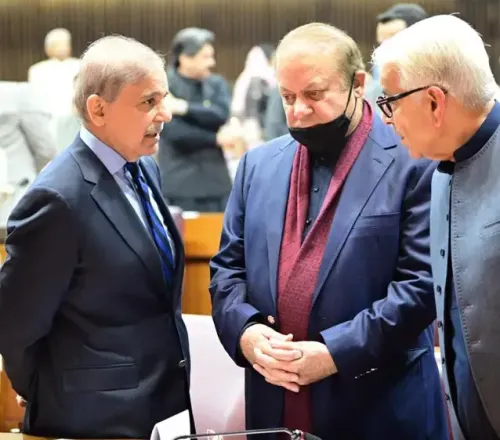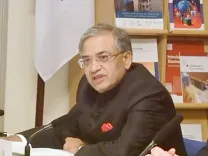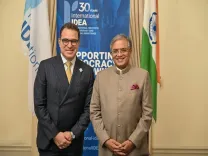How do Indian ethos view the relationship between science and traditional knowledge?

Synopsis
Key Takeaways
- Integration of science and tradition is essential for effective climate action.
- India actively documents indigenous practices for modern adaptation.
- Traditional knowledge offers valuable insights into natural phenomena.
- 'Mission LiFE' promotes environmentally friendly behaviors.
- A culturally-rooted approach enhances climate resilience.
Abu Dhabi, Oct 10 (NationPress) The essence of Indian ethos holds that science and traditional knowledge are not in competition but rather serve to complement one another, stated Union Minister of State for Environment, Forest and Climate Change, Kirti Vardhan Singh, during his address here on Friday.
Singh is spearheading India's participation at the High-Level Roundtable Dialogue at the International Union for Conservation of Nature (IUCN) World Conservation Congress in Abu Dhabi.
The Minister emphasized that the fusion of scientific knowledge with traditional wisdom can be pivotal in addressing the global climate crisis. He reiterated India’s dedication to collaborative climate and conservation initiatives.
“While contemporary science articulates concepts such as sustainability and climate change, India has historically embraced these ideas through practical, nature-respecting lifestyles,” he remarked.
“The philosophy of India suggests that science and traditional wisdom are synergistic rather than adversarial,” the Minister elaborated, highlighting the vast potential for where science intersects with culture and tradition meets innovation.
Singh noted that the significance of conserving natural resources and coexisting harmoniously with nature is deeply embedded in Indian culture and traditions. At the core of these customs lies an adaptability to local environments and a profound cultural affinity with the natural world.
He mentioned that “India is actively working to document, validate, and incorporate these indigenous practices into formal climate adaptation and biodiversity conservation frameworks.”
Examples of traditional knowledge were shared, such as the Toda Tribes of Nilgiris predicting monsoon patterns through ant nesting behaviors and the Jarawas of Andaman foreseeing cyclones by tracking fish movements towards shallower waters.
He also highlighted sustainable water conservation methods from Rajasthan, including Step Wells and the initiative known as ‘Silver Drops of Rajasthan’.
Additionally, he spoke about ‘Mission LiFE’, launched by Prime Minister Narendra Modi, which draws from ancestral wisdom while integrating it with scientific understanding.
“Mission LiFE represents a global movement led by the people, transforming age-old wisdom into actionable steps to confront the pressing issues of climate change and environmental degradation,” Singh stated, underscoring that it “focuses on fostering environmentally conscious behaviors rooted in India’s traditional ethos and knowledge.”
“The Indian approach to environmental conservation advocates a policy framework that is evidence-based, equity-driven, and culturally-rooted,” the Minister asserted.
Singh noted that these efforts reflect India’s vision, where science enhances tradition, and tradition merges with science.
“Intertwining the strands of modern science and traditional knowledge will enable the transition from abstract theories to concrete actions,” he concluded.










